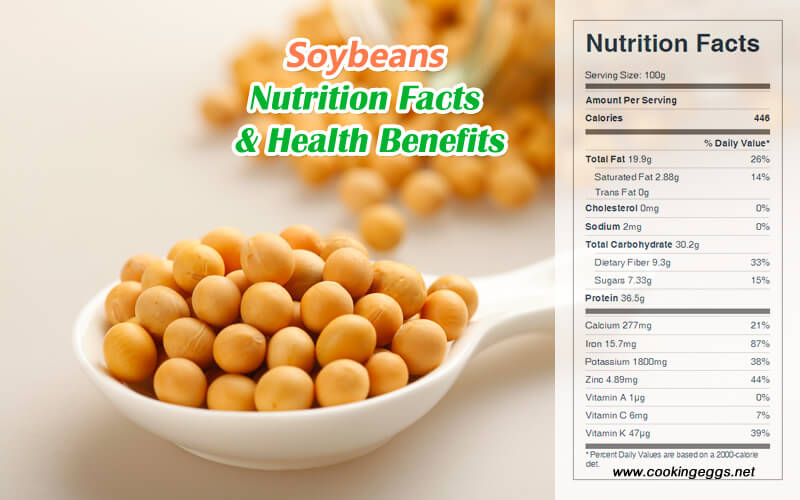Soybean Nutrition Facts and Health Benefits
The soybean is a species of legume native to East Asia, widely grown for its edible beans, which have numerous uses. Soybeans are regarded as a complete protein, providing all the essential amino acids, and soybeans are one of the highest protein legumes.
Soybeans are extraordinarily high in protein, potassium, iron, calcium, fiber, B vitamins, and lecithin (a natural emulsifier of fats that lowers cholesterol). Roasted soybeans are a great way to satisfy the craving for a crunchy snack while still being good for your health.
The Nutritional Value of Soybean
Soybeans comprise approximately 8% seed coat or hull, 90% cotyledons, and 2% hypocotyl axis or germ. A 100-gram reference quantity of raw soybeans supplies 446 kcal of food energy and is 8.5% water, 30% carbohydrates, 20% total fat, and 36% protein.
Soybeans are a rich source of essential nutrients, providing in a 100-gram serving high contents of the Daily Value (DV) especially for protein (36% DV), dietary fiber (33%), iron (87%), manganese (120%), phosphorus (101%) and several B vitamins, including folate (94%). High contents also exist for vitamin K (39%), magnesium (79%), zinc (44%) and potassium (38%).
One-fourth cup of roasted soy nuts provides 202 calories, 14 g carbohydrate, 15 g protein, 11 g fat, 7.6 g dietary fiber, 86 IU vitamin A, 1 mg vitamin C, 90.5 mcg folic acid, 632 mg potassium, 70 mg sodium, 156 mg phosphorus, 59.5 mg calcium, 1.7 mg iron, 62.5 mg magnesium, 1.3 mg zinc, and 0.93 mg manganese.

Raw Soybean Nutrition Facts Label
Health Benefits of Soybean
One benefit of soybeans is that it can replace animal sources of protein that tend to have higher levels of cholesterol and saturated fats. In addition to adding less cholesterol than animal proteins, soy may even have a cholesterol-lowering effect.
Soybean protein is a good source of protein for vegetarians and vegans, as well as people who want to reduce their meat consumption. Many soy products should be beneficial to cardiovascular and overall health due to their high content of polyunsaturated fats, fiber, vitamins, and minerals, and low content of saturated fat.
There is growing evidence that eating traditional soy foods such as tofu may lower the risk of cancers of the breast, prostate, or endometrium (lining of the uterus), and there is some evidence it may lower the risk of certain other cancers as well. A study suggests soybean isoflavone intake is associated with a significant reduced risk of breast cancer incidence in Asian populations.
The insoluble carbohydrates in soybeans consist of the complex polysaccharides cellulose, hemicellulose, and pectin. The majority of soybean carbohydrates can be classed as belonging to dietary fiber. Ingesting the principal soluble carbohydrates of mature soybeans are the oligosaccharides such as raffinose and stachyose. Ingesting these may have some beneficial effects, encouraging indigenous bifidobacteria in the colon against putrefactive bacteria. Reviews of preliminary clinical trials on people with colorectal or gastrointestinal cancer suggest that soy isoflavones may have a slight protective effect against such cancers.
A 2016 review concluded that "current evidence from observational studies and small clinical trials is not robust enough to understand whether soy protein or isoflavone supplements may help prevent or inhibit the progression of prostate cancer." A 2010 review showed that neither soy foods nor isoflavone supplements alter measures of bioavailable testosterone or estrogen concentrations in men. Soy consumption has been shown to have no effect on the levels and quality of sperm. Meta-analyses on the association between soy consumption and prostate cancer risk in men concluded that dietary soy may lower the risk of prostate cancer.
Soybeans contain isoflavones that are phytoestrogens—plant-based estrogens. Initially, phytoestrogens were hailed for their potential to relieve symptoms of menopause and reduce the risk of some cancers, heart disease, and osteoporosis.
Soybeans contain a lot of B-complex vitamins such as Thiamine (76% of DV), Riboflavin (73% of DV), Pantothenic acid (16% of DV), Vitamin B6 (29% of DV), Folate (94% of DV), and Choline (24% of DV). B vitamins are a class of water-soluble vitamins that play important roles in cell metabolism and the synthesis of red blood cells. Each B vitamin is either a cofactor (generally a coenzyme) for key metabolic processes or is a precursor needed to make one, and is thus an essential nutrient.
Soybeans are also a rich source of vitamin K. The main functions of vitamin K are those of blood clotting, the formation of prothrombin (a blood clotting chemical), and normal liver function. It also participates in the synthesis of bone proteins. An adequate intake of vitamin K may help protect against hip fractures.
Health Risk
For human consumption, soybeans must be cooked to destroy the trypsin inhibitors (serine protease inhibitors). Raw soybeans, including the immature green form, are toxic to all monogastric animals.
Soy allergy is common, and the food is listed alongside other common allergens such as milk, eggs, peanuts, tree nuts, and shellfish. allergy may cause cases of urticaria and angioedema, usually within minutes to hours of ingestion. The reason for the discrepancy is likely that soy proteins, the causative factor in allergy, are far less potent at triggering allergy symptoms than the proteins of peanuts and shellfish.